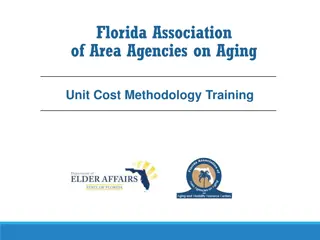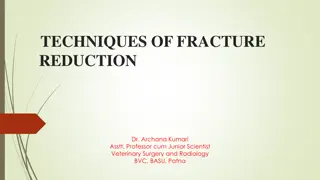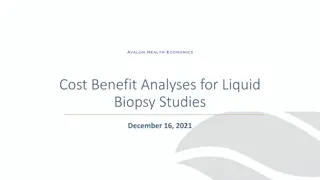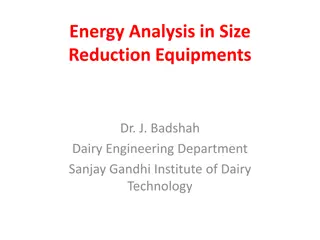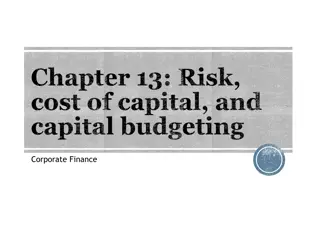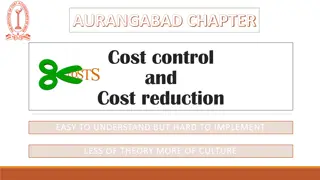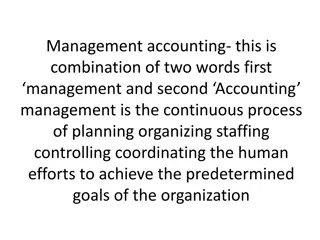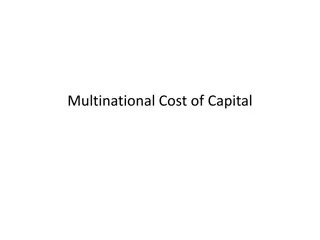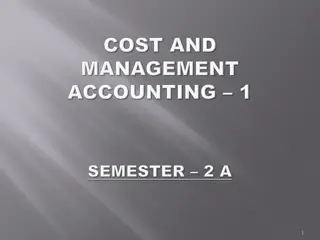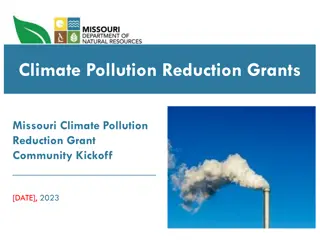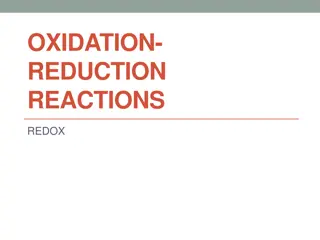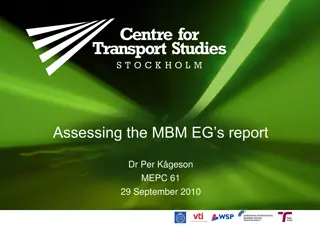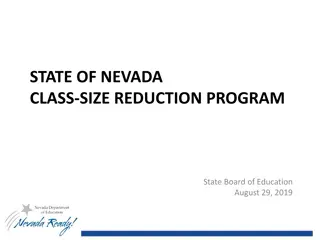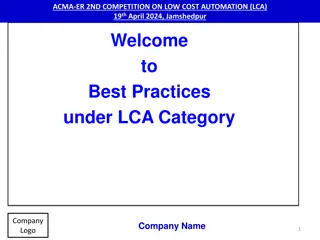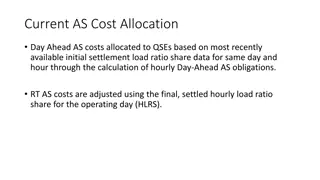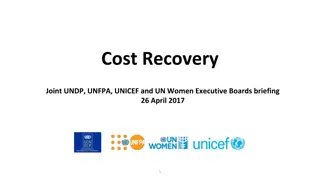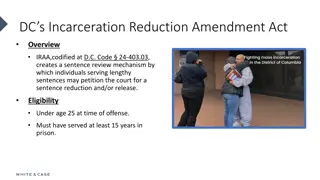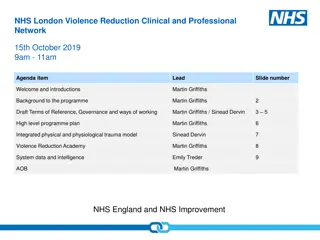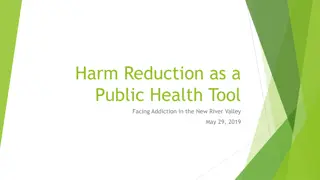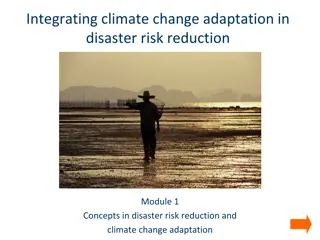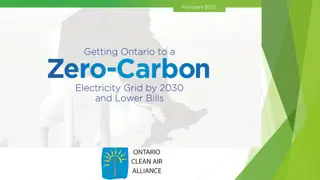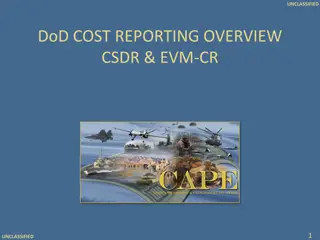Historic Investments in Climate Action: Inflation Reduction Act May 2023
The Inflation Reduction Act (IRA) of May 2023 focuses on making significant investments in climate action to reduce U.S. emissions by an estimated 40% by 2030. This act supports disadvantaged communities, the clean energy industry, and aims to drive emissions reductions over the next decade while pa
5 views • 14 slides
Cost Of Production
Explore the concepts of production cost analysis, focusing on total fixed costs, total variable costs, total cost of production, average cost, and average fixed cost. Learn how these costs behave in the short run and their impact on a firm's operations.
0 views • 26 slides
Understanding Unit Cost Methodology Training for Area Agencies on Aging
This training provides an overview of cost allocation principles and the Unit Cost Methodology (UCM) through video sessions and practical applications using UCM spreadsheets. It covers federal regulations, the operation of UCM, and the importance of cost allocation in federally funded programs. The
2 views • 33 slides
Harm Reduction in Addiction Psychiatry: A Comprehensive Overview
Harm reduction in addiction psychiatry is a client-centered approach that focuses on reducing negative consequences associated with substance use. This philosophy involves practical strategies and principles aimed at promoting safer drug use practices. The historical background traces the evolution
1 views • 40 slides
Techniques of Fracture Reduction in Veterinary Medicine
Explore the techniques of fracture reduction in veterinary surgery, including closed reduction and toggling method, explained by Dr. Archana Kumari. Learn about the advantages of closed reduction, indications for treatment, and the step-by-step technique involved in reducing fractures in animals. Di
0 views • 14 slides
Comprehensive Cost Management Training Objectives
This detailed training agenda outlines a comprehensive program focusing on cost management, including an overview of cost management importance, cost object definition, cost assignment, analysis, and reporting. It covers topics such as understanding cost models, cost allocations, various types of an
2 views • 41 slides
Cost-Benefit Analyses for Liquid Biopsy Studies: Understanding Health Economics and Decision Making
Health economics and decision making play a crucial role in evaluating the clinical utility and cost-effectiveness of liquid biopsies. Economic models such as cost-effectiveness analyses help in determining the incremental cost-effectiveness ratio (ICER) of interventions. Studies have shown varying
0 views • 23 slides
Understanding Energy Analysis in Size Reduction Equipments
This comprehensive overview delves into the energy analysis involved in size reduction equipment, exploring topics such as objectives of size reduction units, sieve analysis for particle size distribution, mesh number system, and mathematical models for energy analysis in size reduction units. Dr. J
0 views • 11 slides
Academic Senate Resolutions and Low-Cost Thresholds in Higher Education
The Academic Senate addresses the adoption of open educational resources (OER) and low-cost materials to support academic freedom and compliance with legislative requirements. The resolution discusses the definition of low-cost resources and the variability among California Community Colleges in set
2 views • 9 slides
Understanding Cost Accounting Essentials
This overview delves into topics such as financial accounting, classification of accounts, cost ascertainment, and management accounting. It covers the meaning of cost, methods and techniques of costing, advantages and limitations of cost accounting systems, and essentials for a robust cost accounti
4 views • 27 slides
Understanding Risk, Cost of Capital, and Capital Budgeting in Corporate Finance
Explore the concepts of risk, cost of capital, and capital budgeting in corporate finance, including the Capital Asset Pricing Model (CAPM), cost of equity, beta estimation, and cost of capital. Learn how to reduce the cost of capital and understand the impact of reducing the Weighted Average Cost o
0 views • 20 slides
Cost Control and Cost Reduction Strategies in Business: Understanding Implementation Challenges
Understanding the concepts of cost control and cost reduction is crucial for businesses, but implementing them can be challenging. This chapter explores the influencing factors for success in cost control and reduction, emphasizing the importance of cultural aspects, leadership, and management appro
1 views • 15 slides
Understanding Activity-Based Costing (ABC) in Cost Management
Activity-Based Costing (ABC) is a strategic costing method that allocates overhead costs to products based on activities. It offers benefits such as accurate cost allocation and identifying cost drivers but also has challenges due to increased complexity and customization. ABC differs from tradition
1 views • 15 slides
Understanding Overall Equipment Effectiveness (OEE) in Practice
Overall Equipment Effectiveness (OEE) is a crucial metric that measures the efficiency of production processes. Initially developed by Japanese expert Seiichi Nakajima, optimizing OEE can lead to increased capacity, cost reduction, better quality, and enhanced efficiencies. Measuring OEE allows for
1 views • 10 slides
Understanding Management Accounting and Cost Accounting
Management accounting involves planning, organizing, and controlling human efforts to achieve organizational goals, while cost accounting focuses on determining the cost of products and services. The objective of cost accounting includes cost analysis, reduction, and decision-making support.
0 views • 33 slides
Understanding the Cost of Capital in Finance
The cost of capital is crucial for businesses to determine the average cost of their finance. The Weighted Average Cost of Capital (WACC) is used as a discount rate in financial calculations. It involves estimating the cost of each source of finance and calculating a weighted average. Additionally,
0 views • 14 slides
Understanding Multinational Cost of Capital
Multinational corporations determine their cost of capital based on the cost of debt and equity. The cost of debt includes the interest rate and credit risk premium, while the cost of equity reflects the risk premium investors demand. Estimating an MNC's cost of capital involves assessing these comp
0 views • 24 slides
Understanding Cost Accounting: Techniques and Processes
Cost accounting is a specialized branch of accounting that involves the accumulation, assignment, and control of costs. It encompasses techniques like ascertainment of costs, estimation of costs, and cost control to aid in decision-making. Cost accounting plays a crucial role in budgeting, standard
2 views • 11 slides
Volkswagen Trust Climate Pollution Reduction Grants Missouri Community Kickoff
Volkswagen Trust Climate Pollution Reduction Grants are part of the Inflation Reduction Act, aiming to reduce greenhouse gas emissions. The grant breakdown includes $250 million for planning grants and $4.6 billion for plan implementation. Missouri's Department of Natural Resources is leading the pl
1 views • 18 slides
Methylene Blue Reduction Test for Milk Quality Assessment
The Methylene Blue Reduction (MBR) test is utilized to assess the quality of milk based on the reduction of color imparted by a dye. The disappearance of color indicates the presence of bacteria in milk. This test involves adding methylene blue dye to milk samples, observing the color change, and me
0 views • 20 slides
Understanding Oxidation-Reduction Reactions in Chemistry
Explore the concept of oxidation and reduction in chemistry, which are fundamental processes that occur simultaneously in oxidation-reduction reactions. Learn about the role of oxygen, different types of oxidation reactions beyond burning, such as bleaching stains, and the concept of reduction invol
0 views • 34 slides
Introduction to Industrial Costing: Understanding Cost Types and Accounting Systems
Explore the fundamentals of industrial costing, including different cost types and accounting systems such as actual cost accounting, normal cost accounting, and standard cost accounting. Learn about cost data control, tasks of cost accounting, and the integration of cost type accounting in cost and
1 views • 24 slides
Understanding Long-Term Reduction Risk in LGP Risk Management Options
In LGP risk management options, long-term reduction risk is a key concern due to factors such as load reductions, permanent grid modifications, and future grid expansion. Utilities must consider the potential impact on both customers and ratepayers, with uncertainties around grid upgrades and cost i
0 views • 10 slides
Maritime Emissions Reduction Strategies and Policy Instruments Overview
Assessment of the Expert Groups' reports on maritime emissions reduction strategies, emphasizing the need for multiple policy instruments targeting new ships, existing ships, and operational aspects. Discusses the negative side effects of flexible policies and the importance of imposing requirements
1 views • 23 slides
Managing Summer Cost Share for Faculty with 9-Month Appointments
Explore the process of setting up and monitoring summer cost share for faculty with 9-month appointments. Learn why cost share for summer may not display on the FEC, how GCA establishes cost share using the Cost Share Module, and how departments should adjust the FEC to reflect summer cost share acc
0 views • 15 slides
Nevada Class-Size Reduction Program Overview
The Nevada State Board of Education implemented the Class-Size Reduction Act to reduce pupil-to-teacher ratios in early grades. Research shows mixed results on the effects of class-size reduction, with studies from various states highlighting different outcomes. The history of class-size reduction r
0 views • 14 slides
ACMA-ER 2nd Competition on Low-Cost Automation (LCA) - 19th April 2024, Jamshedpur
The ACMA-ER 2nd Competition on Low-Cost Automation (LCA) will be held on 19th April 2024 in Jamshedpur. Participants will showcase innovative practices under the LCA category focusing on themes such as safety, quality improvement, cost reduction, and productivity enhancement. The competition aims to
0 views • 18 slides
Electrochemical Reduction of CO2 on Copper and Mixed Metal Oxides
Different methods for CO2 reduction have been studied, with electrochemical reduction showing promise due to its use of electricity from nonconventional sources. Research on copper's unique characteristics for producing various CO2 reduction products has led to investigations into optimizing activit
0 views • 30 slides
Cost Allocation Strategies for Ancillary Services in Electricity Markets
Cost allocation for Ancillary Services (AS) in the electricity market involves distributing costs to Qualified Scheduling Entities (QSEs) based on load ratio share data. Two options are presented: one calculates separate hourly Real-Time Co-optimized Load (RCL) and Non-RCL Load Ratio Share (LRS) for
0 views • 5 slides
Joint UNDP, UNFPA, UNICEF, UN Women Executive Boards Cost Recovery Briefing
Briefing on cost recovery for the joint Executive Boards of UNDP, UNFPA, UNICEF, and UN Women, covering topics such as feedback on cost recovery, role of core resources, cost recovery models using a LEGO approach, harmonization efforts, guidance for Executive Boards, and next steps towards proposing
0 views • 42 slides
DC's Incarceration Reduction Amendment Act Overview
The DC's Incarceration Reduction Amendment Act (IRAA) provides a mechanism for individuals under the age of 25 at the time of offense, who have served at least 15 years in prison, to petition for sentence reduction or release. This Act is based on key US Supreme Court cases relating to the Eighth Am
0 views • 7 slides
NHSL Violence Reduction Clinical & Professional Network Overview
The NHSL Violence Reduction Clinical & Professional Network aims to address the high number of violent incidents in London through a public health approach. Led by Martin Griffiths, the network provides a forum for clinicians and professionals to share expertise, offer strategic leadership, and supp
0 views • 9 slides
Utilizing Harm Reduction for Addressing Addiction in New River Valley
In this presentation, Michael E. Kilkenny discusses the importance of harm reduction as a public health tool in combating addiction issues in the New River Valley. The talk highlights the benefits of harm reduction, components of successful implementation, and measures of program success. It also ad
0 views • 20 slides
Development and Evaluation of Harm Reduction Acceptance Scales
Development of scales to measure the acceptance of harm reduction is crucial for understanding public attitudes towards harm reduction strategies. This project focuses on creating valid and reliable scales through a systematic process involving item development, data collection, analysis, and refine
0 views • 15 slides
Integrating Climate Change Adaptation in Disaster Risk Reduction Module 1
Welcome to the e-Learning module on integrating climate change adaptation in disaster risk reduction. This module covers concepts in disaster risk reduction and climate change adaptation. It is part of a package that includes five modules focusing on vulnerability, disaster risk reduction, climate c
0 views • 29 slides
Ontario's Electricity Plan: Balancing Carbon Reduction and Cost Efficiency
Ontario's electricity plan under Doug Ford's leadership has faced criticism for increasing greenhouse gas pollution and investing heavily in high-cost nuclear projects. Recommendations from Ontario municipalities call for a return to 2017 pollution levels and a complete phase-out of gas power by 203
0 views • 14 slides
Defense Cost Reporting and Systems Overview
Defense Cost Analysis and Reporting Systems (CSDR) provide the cost community with essential data for developing independent cost estimates within major defense acquisition programs. The Defense Automated Cost Information Management System (DACIMS) offers instant access to historical cost informatio
0 views • 19 slides
Importance of Cost Accounting in Business Management
Cost accounting plays a crucial role in modern business environments where cost effectiveness and quality consciousness are vital for success. This branch of accounting helps in planning, controlling, and determining the costs of products or services, providing essential data for efficient managemen
0 views • 6 slides
Enhancing Disaster Risk Reduction in the Philippines
The Philippine Disaster Risk Reduction and Management Act of 2010, also known as Republic Act 10121, replaced PD 1566 and introduced a proactive approach to disaster management, focusing on risk reduction and building community resilience. The new law aims to transform and reform disaster response b
0 views • 26 slides
Integrated Reduction Technique for Double Precision Accumulator
An integrated reduction technique for a double precision accumulator is discussed in the research paper by Krishna Nagar, Yan Zhang, and Jason Bakos from the University of South Carolina. The paper addresses issues related to double precision accumulation in kernels targeted for acceleration, presen
1 views • 25 slides


